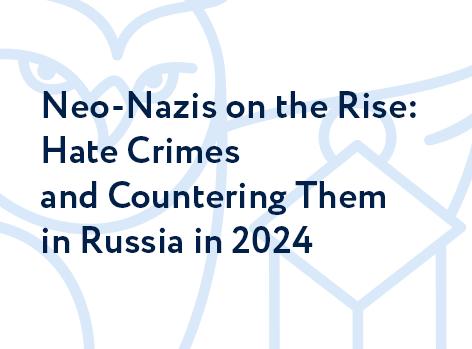The following is our review of racism and xenophobia in Russia during March 2015. The data we report are collected in the course of Sova Center’s daily monitoring activities.
In March 2015, at least two people were targeted by ultra-right-wing attackers in the Volgograd Region.
Overall since the beginning of this year, at least 20 people have been injured in racist and xenophobic attacks, and 2 people killed. The attacks took place in seven Russian regions including Moscow and the Moscow Region, St. Petersburg, the Volgograd, Nizhny Novgorod and Sverdlovsk regions and the Republic of Karelia (remember these statistics do not include the victims of the incidents in the North Caucasus and Crimea).
In March we also recorded two acts of vandalism clearly motivated by xenophobia. In Volgograd, unidentified vandals desecrated the foundation stone of the monument marking the site of a mass execution of Jews by the Nazis. In Novosibirsk, a youth center was vandalized. Overall, this year has seen at least 10 acts of xenophobic vandalism.
Public ultra-right activities were high in March, the International Russian Conservative Forum in St Petersburg, on March 22, 2015 probably being the most high-profile event staged by ultra-right-wingers. Hosted in the local Holiday Inn, the forum convened a number of radical nationalists and neo-Nazis from Europe. The forum was actually organized by the St. Petersburg branch of the Rodina party, while the Russian National Cultural Center Narodny Dom officially ran the event. For more information see the report by the Sova Center’s St. Petersburg monitor.
Some members of various nationalist groups took part in the march in memory of Boris Nemtsov on March 1.
A group of young people carrying imperial flags and wearing masks were stopped by the police who prevented them from joining the march, while activists of the Narodnaya Volya (People's Will) movement (part of the former Volnitsa group) were detained for carrying a flag with a Celtic cross on it.
On March 15, nationalist groups organized the so-called Day of Russian Solidarity, to protest against Article 282 of the Russian Criminal Code, with at least 19 Russian cities joining the initiative. However, most events gathered no more than a few people. Some 50 picketers gathered outside the Ulitsa 1905 Goda metro station in Moscow, the protest organized by Andrey Savelyev's Velikaya Rossiya (Great Russia) party. Other groups that joined the picketing included Dmitry Bobrov’s National-Socialist Initiative (NSI), Yury Mukhin’s Za otvetstvennuyu Vlast (For Responsible Authority) and the National Democratic Party (NDP). In St. Petersburg, Velikaya Rossiya and Russian National Front organized a rally in Marsovo Polye, together with Nikolay Bondarik. It was attended by no less than 70 people, while the NSI held its own event in that city.
We did not record any convictions for racist violence in March 2015; however, since the beginning of this year, courts have issued four sentences for violent crimes motivated by hatred. Six individuals have been convicted in four Russian regions. On March 31, 2015 the court convicted four members of the notorious BORN (Combat Organization of Russian Nationalists).
There were ten convictions against 11 people for xenophobic propaganda, in seven regions of the country last month. Overall since the beginning of this year, at least 35 verdicts have been issued for xenophobic propaganda against 38 people, in 24 regions of Russia.
The Federal List of Extremist Materials was updated six times last month (on March 10, 13, 19, 23, 26 and 27); entries 2621- 2680 were added. The additions include materials from Muslim militants, printed, video and audio xenophobic content such as Skinhead Bible II, materials from Karelian nationalists, music tracks by the Opravdanny Terrorizm group, Jehovah's Witnesses’ brochures, The Basics of Hanafi Doctrine thesis, Untermenschen by Boris Stomakhin, as well as books by Vladislav Shumsky, Alexey Trekhlebov and Mikhail Volkov, and Hizb ut-Tahrir materials.
The Federal List of Extremist Organizations, which is published on the Ministry of Justice website, was updated to include the Jehovah's Witnesses’ Samara branch deemed extremist by the Samara Regional Court on May 29, 2014.
Therefore, the list now
includes 42 organizations (excepting the 19 groups deemed terrorist) banned by
courts, and whose continued activities would violate Article 282.2 of the
Criminal Code (organizing activities of an organization banned for extremism).



